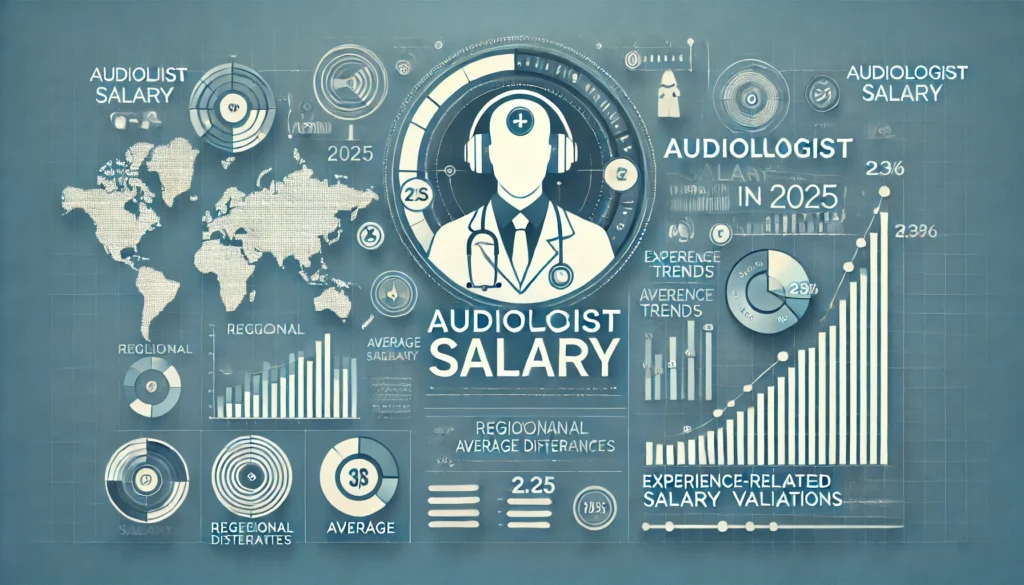How much does an audiologist earn in 2025, and what factors influence their salary? The healthcare industry is a rapidly growing field with many specialized roles, and audiology is one such career path that has seen increasing demand in recent years. As individuals and communities emphasize hearing health more, the need for trained audiologists continues to rise. But how much can an audiologist expect to earn in 2025? What factors affect their salary, and how do these professionals stack up against other healthcare workers? In this article, we will delve into audiologist salary trends, explore regional differences, and discuss the factors that influence how much audiologists can earn.
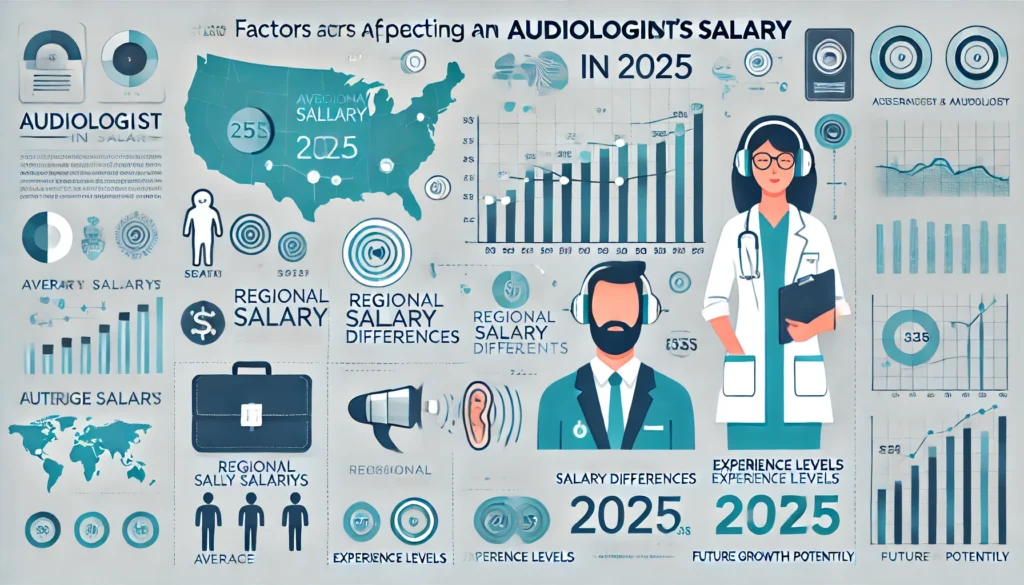
What is the Average Audiologist Salary in 2025?
Audiologists are healthcare professionals who specialize in diagnosing and treating hearing loss and balance issues. As the demand for hearing aids, cochlear implants, and other auditory health services increases, so does the need for qualified audiologists. Understanding the typical salary for this profession is essential for anyone considering a career in audiology.
Understanding the Audiologist Salary Range in 2025
As of 2025, the average salary for an audiologist in the United States varies depending on experience, location, and other factors. The average annual salary for an audiologist is typically between $75,000 to $95,000 per year. According to the U.S. Bureau of Labor Statistics (BLS), the median annual wage for audiologists in May 2023 was $81,500. However, these numbers can fluctuate based on a variety of circumstances.
- Entry-Level Salary: A new field graduate can expect to earn between $60,000 and $75,000 annually, depending on the employer and location.
- Mid-Career Salary: With 5-10 years of experience, audiologists can expect to earn between $85,000 and $100,000.
- Experienced Audiologists: Professionals with over 10 years of experience can earn anywhere from $100,000 to $120,000.
Salary Comparison: Audiologist vs. Other Healthcare Professions
When comparing audiologist salaries to other healthcare professions, audiologists earn a competitive salary, though it’s often lower than some other specialists. For example:
- Speech-Language Pathologists: Typically earn between $75,000 and $95,000, similar to audiologists.
- Physical Therapists: The median salary for physical therapists is approximately $85,000 to $95,000.
- Occupational Therapists: Generally earn $80,000 to $95,000 annually.
- Doctors and Surgeons: Medical professionals in specialties like anesthesiology and orthopedic surgery can earn $300,000 or more annually, making their salaries significantly higher than those in audiology.
While audiologists earn less than some of these specialists, their salary remains competitive, particularly considering the relatively shorter educational path and the demand for their services.
Audiologist Salary in Different States or Regions
The salary for audiologists can vary significantly based on location. Some states offer higher wages due to the cost of living, service demand, or regional disparities in healthcare funding. For example:
- California: Audiologists in California tend to have higher salaries, with averages ranging from $90,000 to $110,000 per year.
- New York: New York audiologists’ salaries are also higher, typically ranging from $85,000 to $105,000.
- Texas: In Texas, the salary range for audiologists tends to be more moderate, around $75,000 to $90,000.
- Florida: Audiologists in Florida earn a median salary of about $80,000 to $95,000, influenced by the state’s aging population and demand for hearing services.
Additionally, rural areas may offer higher salaries to attract qualified professionals. At the same time, large urban centers may have more competition, affecting the overall pay (Check out healthcare salary variations across the U.S. to see where your field is most lucrative).
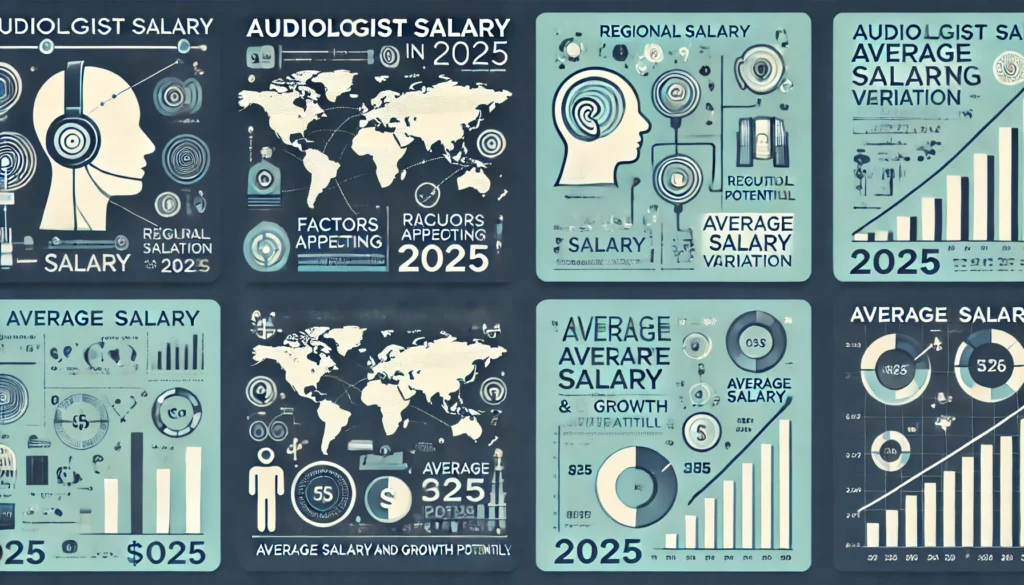
Audiologist Starting Salary: What to Expect in 2025
For recent graduates or those considering a career switch to audiology, understanding what to expect as a starting salary is crucial. The starting salary for an audiologist in 2025 will vary depending on education, location, and job market conditions.
Entry-Level Audiologist Salary Trends
You can earn between $60,000 and $75,000 annually as an entry-level audiologist. However, it’s important to note that salaries tend to improve quickly with experience and additional certifications. Starting salaries may also vary based on where you choose to practice. Urban centers with a higher audiologist demand might offer higher starting salaries to attract talent.
- Hospitals and Healthcare Systems: Audiologists working for large hospital networks or healthcare systems may receive slightly higher salaries due to the scale of their operations and patient load.
- Private Practices: Audiologists working in private practices or solo clinics may earn less initially but could benefit from performance-based bonuses or profit-sharing options.
Impact of Certifications and Education on Starting Salary
Your educational background plays a significant role in determining your starting salary. Audiologists typically hold a Doctor of Audiology (Au.D.) degree, which usually requires 4 years of postgraduate education. Additional certifications or specialized training can help increase starting salaries.
- Board Certification: Audiologists certified by professional organizations such as the American Speech-Language-Hearing Association (ASHA) or the American Board of Audiology (ABA) may see a boost in their starting salaries.
- Specializations: Audiologists specializing in areas such as pediatric audiology, cochlear implants, or vestibular assessment may command higher starting salaries due to the specialized nature of their work.
Benefits and Perks for New Audiologists
In addition to salary, entry-level audiologists may receive a comprehensive benefits package, which can significantly impact total compensation. Benefits may include:
- Health Insurance: Most employers offer medical, dental, and vision insurance.
- Retirement Plans: Audiologists may be offered a 401(k) or pension plan with employer matching.
- Paid Time Off (PTO): Vacation days, sick leave, and paid holidays are commonly offered.
- Bonuses and Incentives: Some employers provide performance-based bonuses, which can increase overall earnings.
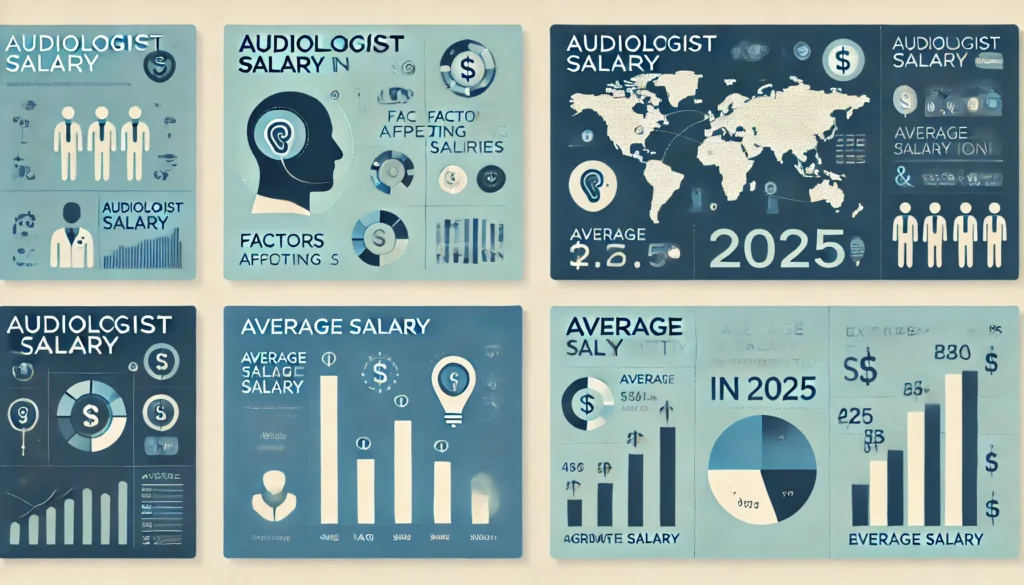
Factors That Affect Audiologist Salary
Several key factors influence audiologist salaries. While education and experience are obvious contributors, other elements such as region, employer type, and work environment also play a role in determining how much audiologists earn.
Experience and Specialization
As with most professions, experience is a key factor in determining salary levels. Audiologists with 5-10 years of experience generally earn higher salaries than those just starting. However, specialization can also lead to increased earnings.
- Specialized Skills: Audiologists with expertise in specific areas, such as pediatric audiology, audiological rehabilitation, or neuro-audiology, often command higher salaries due to the specialized nature of their work.
- Supervisory Roles: Audiologists who take on supervisory or managerial roles may see a salary increase. Leading a team of audiologists or managing a department can lead to higher pay.
Regional Salary Variations
As mentioned earlier, regional variations in salary exist. The cost of living, local audiologist demand, and healthcare funding all contribute to these variations. Rural areas may offer higher wages to attract qualified professionals, while significant cities might offer more opportunities but with slightly lower compensation due to competition.
Work Environment and Employment Type
Audiologists work in various settings, including hospitals, private practices, universities, and research institutions. The type of employer can influence salary.
- Private Practices: Audiologists working in private settings may receive more flexible work arrangements, but salaries can be lower than hospital or university positions.
- Hospitals: Large healthcare facilities or hospital systems tend to offer more competitive salaries, with benefits such as health insurance and retirement plans.
- Academia: Audiologists working in universities or research institutions may have a lower salary but may benefit from academic perks such as research opportunities, sabbaticals, and tenure.
Growth Prospects in Audiology: Salary Outlook for the Next Decade
Audiology is a growing field, and the demand for professionals in this area is expected to increase significantly in the coming years. The Bureau of Labor Statistics (BLS) predicts that the job outlook for audiologists will grow by 13% between 2022 and 2032, much faster than the average for all occupations. As a result, salaries are expected to increase over the next decade.
Projected Audiologist Salary Growth (2025-2035)
The salary for audiologists is expected to rise in line with job demand. As more people experience hearing loss, especially with an aging population, the demand for audiology services will likely continue to rise. This will drive higher salaries across the field.
Audiologists with experience and specialized certifications may see even more significant salary growth as they are in greater demand due to their specialized skills. According to industry trends, salaries for experienced audiologists could exceed $120,000 per year by 2035.
The Role of Technological Advancements in Audiologist Compensation
Technology is transforming the audiology field. Advances in hearing aids, cochlear implants, and tele-audiology are reshaping how audiologists deliver care. Audiologists who stay current with these technological advancements may see higher salaries due to their expertise in these areas.
The Impact of the Aging Population on Audiologist Salaries
The aging population is another factor driving the growth of the audiology field. As people age, they are more likely to experience hearing loss, increasing the need for audiologists. This trend will likely result in higher salaries and more jobs.
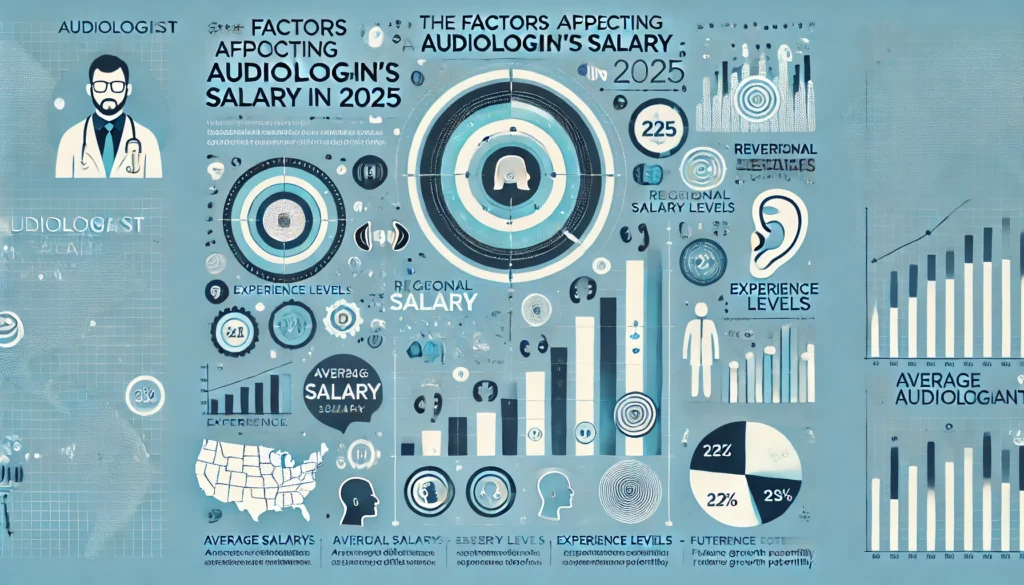
Salary Insights for Audiologists in 2025
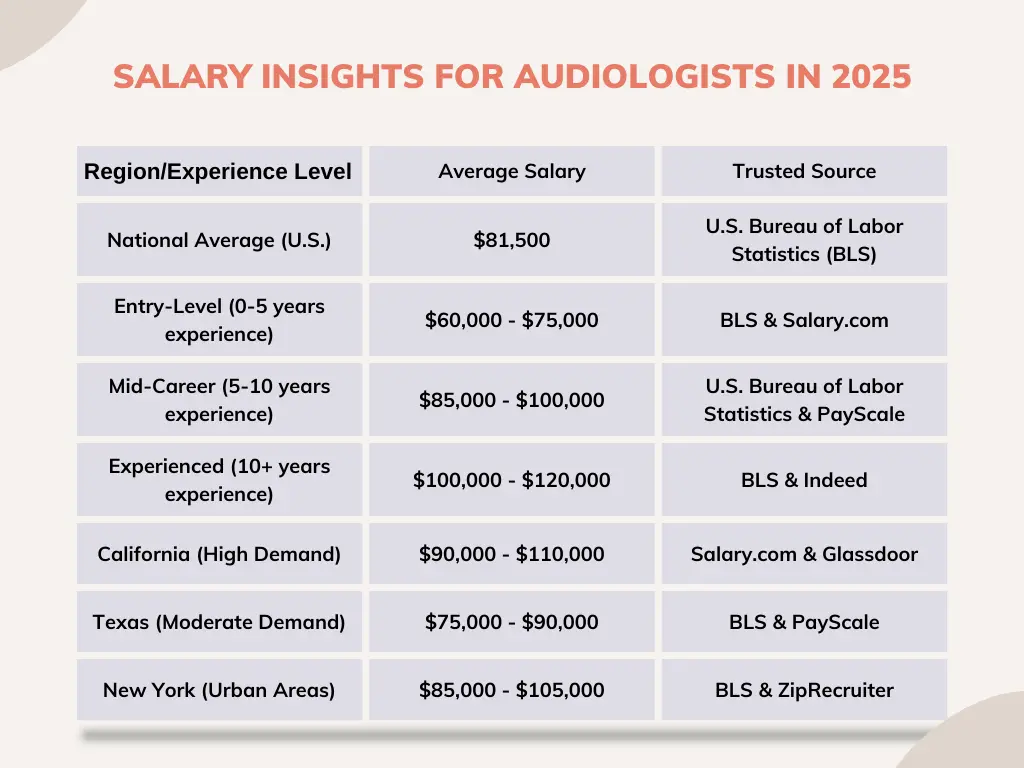
FAQ Section:
1. What is the average salary for an audiologist in 2025?
The average salary for an audiologist in 2025 is approximately $81,500 per year, according to the U.S. Bureau of Labor Statistics. However, salaries can vary based on experience, location, and specialization.
2. How does location affect an audiologist’s salary?
Location plays a significant role in determining an audiologist’s salary. States like California and New York offer higher salaries due to demand, cost of living, and healthcare infrastructure, with salaries ranging from $85,000 to $110,000. In contrast, salaries in more rural states like Texas may range from $75,000 to $90,000.
3. What is the salary difference between entry-level and experienced audiologists?
Entry-level audiologists can expect to earn between $60,000 and $75,000 annually, while audiologists with 5-10 years of experience typically earn between $85,000 and $100,000. Experienced professionals with over 10 years of experience can make up to $120,000 or more annually.
4. Can an audiologist earn more with specializations?
Yes, audiologists specializing in pediatric audiology, cochlear implants, or vestibular assessment can earn higher salaries. Specialization can add $5,000 – $10,000 to an audiologist’s base salary, depending on the region and demand for these skills.
5. What is the job outlook for audiologists in the coming years?
The demand for audiologists is expected to grow by 13% from 2022 to 2032, much faster than the average for all occupations. This growth is driven by an aging population and increasing hearing health awareness. As a result, audiologist salaries are expected to continue rising, particularly for those with specialized skills and experience.

